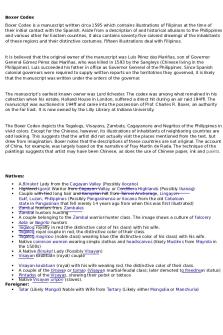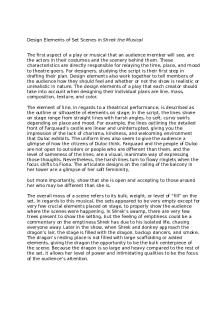The Boxer Rebellion - Grade: A PDF

| Title | The Boxer Rebellion - Grade: A |
|---|---|
| Author | Tapiwa Musimbe |
| Course | Asia: Modern China, India and Japan |
| Institution | Columbia College Chicago |
| Pages | 4 |
| File Size | 83.6 KB |
| File Type | |
| Total Downloads | 61 |
| Total Views | 131 |
Summary
The Boxer Rebellion...
Description
Musimbe 1 Lilly Musimbe Asia: Modern China 01 Professor Jo February 10, 2019 “A Prisoner of the Boxer Rebellion, 1900”
The war faced between Chinese peasants and their foreign invaders is well-known as the Boxer Rebellion, which occurs during the Qing Dynasty in the late 18th century. The name “Boxers” (also known as “Righteous and Harmonious Fists”) was given to a group of peasants in northern China that lead the rebellion to rid their country of foreigners and their influences forced into their way of living. In the early 1900’s, the boxers would begin their conquest to kill foreigners and christians as they flee to find refuge from the violent group. Towards the summer of 1900, nations such as the United States, Britain, France, etc. came together with their forces to provide protection for foreigners and christian missionaries against the Boxers, it was known as the “China Relief Expedition”. This was a significant moment in American history because it was the first time since the American Revolution that the U.S. cooperated with a foreign power in a military operation. The rebellion was ended with the Boxer Protocol, giving foreigners their territory rights in China and leaving the country with an immense amount of debt due to the damage executed onto the foreigners. Luella Miner gives her insight on the life of a foreigner during the Boxer Rebellion through the personal journal she kept. By analyzing this primary document, the reader is able to place themselves in the perspective of a foreigner as Miner describes the tension-filled relationship between social classes in the Qing dynasty.
Musimbe 2 Luella Miner was an American citizen who was sent to China by the American Board of Commissioners for Foreign Missions to teach the school children of Beijing in 1888. During her time, she was a key eye witness to the horror that was the Boxer Rebellion. With her journal, Miner describes the true violence witnessed by herself personally as she fears for her safety in her day to day life. This group’s aggressive acts would range from rioting and looting outside her city legation to killing those with any affiliation to foreign or christian ties. Miner was kept in refuge for over two months, with those also in need, until forces were able to make their way towards the British legation they resided in. In those two months, these foreigners were faced with many new challenges caused by the rebellion. without connection to the world outside of their walls with little food left for survival, sacrifices were caused resulting in the death of thousands . Miner describes her surroundings as she mentions the “barricades of barbed wire” built for their protection, only to be continuously broken down by those who mean harm. Boxers would continue to riot by all means to ensure that fear was instilled in these foreigners wherever they would find themselves in China. As if the situation couldn’t be more threatening, Miner states hearing the group’s chant violent quotes such as “Kill the foreign devils!...Kill! Kill! Kill!” The question lies: why do“Boxers” have so much resentment towards foreigners and christians? It seems a little over the top to visualize the group as devils without good reasoning for the given title. The answer could be that the chinese were merely jealous. In this moment of history, the chinese government experienced weakness and was not able to present themselves as inferior to its rivals. With their government at its lowest, foreigners were single-handedly granted easy access to their lands and product. Natives would watch foreigners take over their lives only to be left poor on their own land, causing much controversy over the strong influence other
Musimbe 3 nations had in China. These foreigners affect their social class, the balance of their equality, the power that is China. Not only does the Qing dynasty government play a key role in the creation to the Boxer Rebellion, they encouraged the killings because they believed the Gods were angry. It was not until christian missionaries began pushing the boundaries did they soon become targets of the cause as well. Boxers believed converted christians were the cause of drought occuring, unabeling crops to grow due to their God punishing those who stray. As more chinese people would convert to christian beliefs, the more who would be killed for these same beliefs of hope and a peaceful eternity.In order for them to prove their dominance to the west, these “Boxers” wanted nothing more than to take back their country and erase any kind of foreign influence present in China . They want to show that they are capable of being efficient in providing for their needs without the aid of outside influence. Author Luella Miner gives us the opportunity to visualize for ourselves what it was like to be a target of a genocide, although very few would like to take up on the offer. Her documents hold significance because it was a key point in chinese history and she was able to capture these moments on paper, being the one to witness this clash of cultures. The Boxer Rebellion was a burden on China for years to come after, setting the country’s development at a slow pace compared to other regions. China would soon owe dues to foreign nations in reconcile to the participating parties and the genocide initiated upon their people. Almost immediately, the Qing dynasty collapsed under weak forces as the situation of the country became dire. China would come to learn that their planned conquest would continue to haunt their lands as they continue to pay for the many repercussions caused by the Boxer Rebellion.
Musimbe 4
Bibliography Miner, Luella. "“A Prisoner of the Boxer Rebellion, 1900”." The Black Death, 1348. Accessed February 10, 2019. h ttp://www.eyewitnesstohistory.com/boxer.htm.
"United States History." Douglas MacArthur. Accessed February 13, 2019. https://www.u-s-history.com/pages/h902.html.
History of the Transistor. Accessed February 13, 2019. http://www.sjsu.edu/faculty/watkins/boxer.htm....
Similar Free PDFs

The Boxer Rebellion - Grade: A
- 4 Pages

The Wodaabe - Grade: A
- 3 Pages

The Murderess - Grade: A
- 3 Pages

The balloon - Grade: A
- 3 Pages

The Olmecs - Grade: A
- 5 Pages

BC - Boxer Codex
- 2 Pages

The Strategic Process - Grade: A
- 6 Pages

The Jungle Essay - Grade: A+
- 6 Pages

THE Ghostly Visitors - Grade: A
- 6 Pages

The Grand Canyon - Grade: A
- 4 Pages

The Black Cat - Grade: A
- 5 Pages

Breaching the Norm - Grade: A+
- 3 Pages

The Magic Pill - Grade: A
- 2 Pages

Shrek the Musical - Grade: A
- 3 Pages
Popular Institutions
- Tinajero National High School - Annex
- Politeknik Caltex Riau
- Yokohama City University
- SGT University
- University of Al-Qadisiyah
- Divine Word College of Vigan
- Techniek College Rotterdam
- Universidade de Santiago
- Universiti Teknologi MARA Cawangan Johor Kampus Pasir Gudang
- Poltekkes Kemenkes Yogyakarta
- Baguio City National High School
- Colegio san marcos
- preparatoria uno
- Centro de Bachillerato Tecnológico Industrial y de Servicios No. 107
- Dalian Maritime University
- Quang Trung Secondary School
- Colegio Tecnológico en Informática
- Corporación Regional de Educación Superior
- Grupo CEDVA
- Dar Al Uloom University
- Centro de Estudios Preuniversitarios de la Universidad Nacional de Ingeniería
- 上智大学
- Aakash International School, Nuna Majara
- San Felipe Neri Catholic School
- Kang Chiao International School - New Taipei City
- Misamis Occidental National High School
- Institución Educativa Escuela Normal Juan Ladrilleros
- Kolehiyo ng Pantukan
- Batanes State College
- Instituto Continental
- Sekolah Menengah Kejuruan Kesehatan Kaltara (Tarakan)
- Colegio de La Inmaculada Concepcion - Cebu

